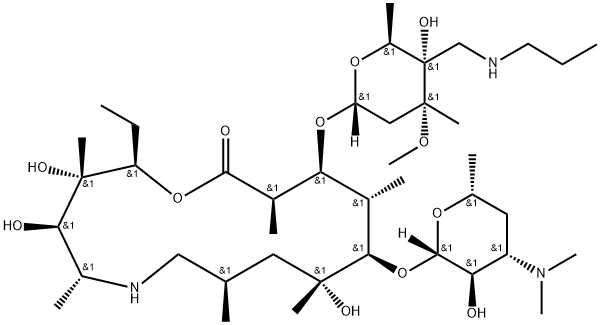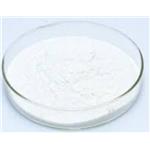Description
Tulathromycin A, marketed as Draxxin by Pfizer Inc., is a triamide antibiotic used for the treatment of respiratory diseases in cattle and pigs. It exists as a balanced mixture of two isomers, Tulathromycin A (90%) and B (10%). Tulathromycin is an antimicrobial agent of a macrolide, a 15-membered macrolide structure that is considered a triamide macrolide with three charged nitro groups.
Chemical Properties
Tulathromycin is a semi-synthetic macrolide antibiotic of the sub-class triamilide. It occurs as a white to off-white crystalline powder that is readily soluble in water at pH less than 8. At a pH of 7.4 (physiological pH), tulathromycin (a weak base) is 50 times more soluble in hydrophilic than hydrophobic media.
Uses
Tulathromycin A is used for the treatment of pulmonary diseases in pigs and cattle.
In cattle, tulathromycin is used for the treatment of rinderpest caused by Haemolytic rinderpest, polyvalent rinderpest and Haemophilus somnus (formerly Haemophilus somnus). It is also effective in the treatment of infections caused by Mycoplasma bovis. When used in high-risk calves, it is also used to prevent infections caused by these pathogens. It is also used for the treatment of bovine foot rot (interdigital necrotizing fungal disease) associated with Fusarium necrophorum and Fusarium oxysporum. A single dose is effective in bovine infectious keratoconjunctivitis (Mycobacterium bovis).
In pigs, it is used to control and treat SRD associated with Actinobacillus pleuropneumoniae, Bacteroides multilocularis, Bordetella bronchiseptica, Mycoplasma pneumoniae, and Haemophilus parasiticus, and tulathromycin has been used to treat lung abscesses.
Definition
ChEBI:Tulathromycin A is an aminoglycoside.
Biological Activity
Tulathromycin, like other macrolides, exerts therapeutic benefits not solely explainable by antibacterial activity. Like azithromycin, tulathromycin A may have multiple immunomodulatory effects that likely contribute to the therapeutic response in respiratory infections and perhaps other diseases[1]. Other beneficial effects may be caused by enhanced degranulation and apoptosis of neutrophils and inhibition of inflammatory cytokine production. It also may help clear infections by enhancing macrophage functions.
Pharmacokinetics
The half-life is long, with 80- to 90-hour plasma half-life in pigs and cattle, and 8- and 6-day tissue half-life in cattle and pigs, respectively, which prolongs the drug concentration at the site of infection. The volume of distribution is greater than 10 L/kg. Absorption from injection is greater than 80% in cattle and pigs. Tulathromycin A concentrates in bronchoalveolar cells, and concentrations are detectable for at least 8 days after a single administration, although they are still lower than the MIC for R. equi (greater than 64 μg/mL)[1-2].
Mode of action
Tulathromycin A is a macrolide antibiotic. It binds to the subunit 50S of the bacterial ribosome, interfering with bacterial protein synthesis.
References
[1] Mark G, et al. Tulathromycin. Papich Handbook of Veterinary Drugs (Fifth Edition), 2021; 949-951.
[2] Jennifer L, et al. Pharmacologic Principles. Equine Internal Medicine (Fourth Edition), 2018; 79-137.




